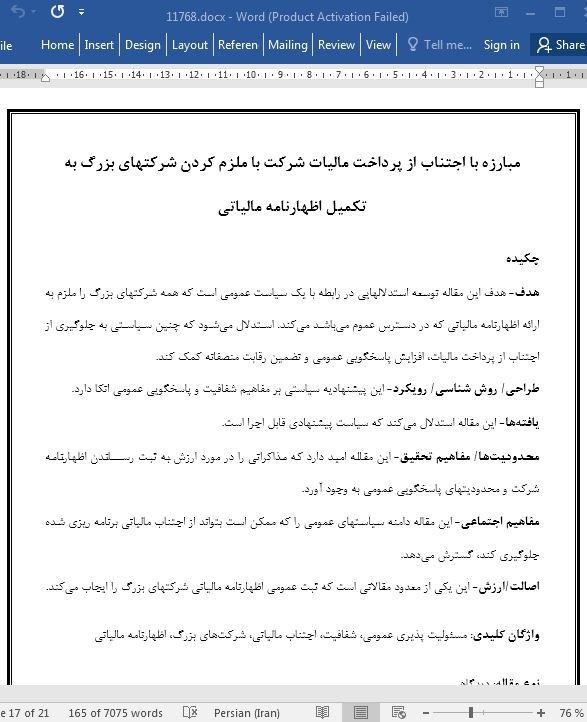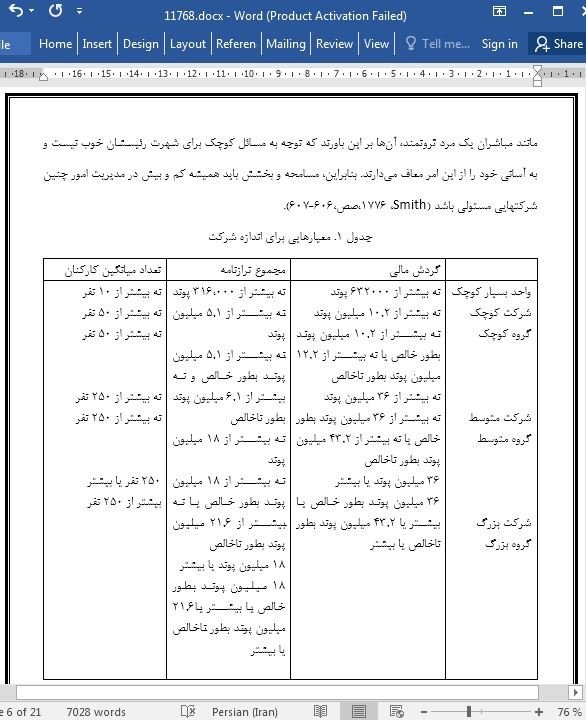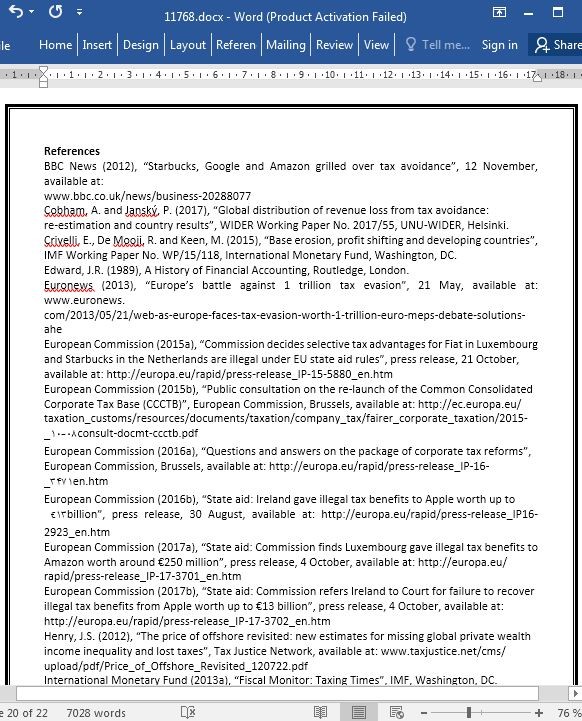
مبارزه با اجتناب از پرداخت مالیات شرکت با ملزم کردن شرکتهای بزرگ به تکمیل اظهارنامه مالیاتی
چکیده
هدف- هدف این مقاله توسعه استدلالهایی در رابطه با یک سیاست عمومی است که همه شرکتهای بزرگ را ملزم به ارائه اظهارنامه مالیاتی که در دسترس عموم میباشد میکند. استدلال میشود که چنین سیاستی به جلوگیری از اجتناب از پرداخت مالیات، افزایش پاسخگویی عمومی و تضمین رقابت منصفانه کمک کند.
طراحی/ روش شناسی/ رویکرد- این پیشنهادیه سیاستی بر مفاهیم شفافیت و پاسخگویی عمومی اتکا دارد.
یافتهها- این مقاله استدلال میکند که سیاست پیشنهادی قابل اجرا است.
محدودیتها/ مفاهیم تحقیق- این مقاله امید دارد که مذاکراتی را در مورد ارزش به ثبت رساندن اظهارنامه شرکت و محدودیتهای پاسخگویی عمومی به وجود آورد.
مفاهیم اجتماعی- این مقاله دامنه سیاستهای عمومی را که ممکن است بتواند از اجتناب مالیاتی برنامه ریزی شده جلوگیری کند، گسترش میدهد.
اصالت/ارزش- این یکی از معدود مقالاتی است که ثبت عمومی اظهارنامه مالیاتی شرکتهای بزرگ را ایجاب میکند
مقدمه
اجتناب از پرداخت مالیات یکی از نگرانیهای عمومی است، زیرا ظرفیت دولتهای منتخب دموکراتیک را در مواجهه با سیاستهای تعیین شده از طریق صندوق رأی، از جمله اختیار سرمایه گذاری در زیرساختهای اجتماعی و توزیع مجدد درآمد و ثروت به منظور تضمین پایداری اجتماعی، مختل میسازد. تعیین میزان مالیات اجتناب شده/ پرداخت نشده به دلیل محرمانه بودن و ایهامی که دارد، کار دشواری است. بطور کل، 28 کشور عضو اتحادیه اروپا (EU) همانطور که برآورد شده حدود یک تریلیون یورو در هر سال زیان دارند (Euronews، 2013). برآورد شده است که بین 7.6 تا 32 تریلیون دلار از ثروت جهان به دلیل حوزههای مالیاتی پایین یا معافیت مالیاتی و در کل فرار از پرداخت مالیات پنهان میماند (Henry، 2012؛ Zucman، 2015).
خلاصه و بحث
این مقاله به دنبال این استدلال است که ثبت عمومی اظهارنامه مالیاتی شرکتهای بزرگ همراه با اطلاعات مرتبط با آن به کنترل اجتناب از پرداخت مالیات کمک میکند. این امر موجب تقویت بررسی عمومی و پارلمانی شرکتها و متصدیان مالیاتی میشود. افزایش شفافیت و پاسخگویی عمومی موجب اعمال فشار بر شرکتها میشود تا شیوههای خود را اصلاح کنند. ثبت عمومی اظهارنامه مالیاتی شرکتهای بزرگ موجب بهبود رقابت نیز میشود. با این حال، برخی از مخالفان ممکن است به هزینه پرونده بندیهای عمومی علی رغم ناچیز بودن آن اشاره کنند. این مخالفان معمولاً هزینههای اجتماعی مرتبط با محرمانگی را نادیده میگیرند. شرکتها در صورت عدم وجود پرونده بندیهای عمومی همچنان به افراط در شیوههای اجتناب از پرداخت مالیات ادامه میدهند و موجب تحلیل درآمدهای عمومی شده که یا شهروندان را ملزم به پرداخت مالیات بیشتری میکند و یا بر حقوق اجتماعی که به سختی به دست آمدهاند مقدم میشوند که هیچ یک از اینها برای رفاه اجتماعی یا ثبات اجتماعی بلندمدت سودمند نیستند.
Abstract
Purpose – The purpose of this paper is to develop arguments for a public policy of requiring all large companies to make their tax returns publicly available. It is argued that such a policy would help to check tax avoidance, strengthen public accountability and secure fair competition.
Design/methodology/approach – The policy proposal rests on notions of transparency and public accountability.
Findings – The paper argues that the proposed policy is feasible.
Research limitations/implications – The paper hopes to stimulate debates about the value of public filing of corporate returns and limits of public accountability.
Social implications – The paper extends the range of public policies which might be able to check organised tax avoidance.
Originality/value – It is one of the few papers to call for public filings of large company tax returns.
Introduction
Tax avoidance is a matter of public concern as it disables the capacity of democratically elected governments to meet policies mandated through the ballot-box, including the mandate to invest in social infrastructure and redistribute income and wealth to secure social stability. Due to secrecy and opacity, the amount of tax avoided/evaded is hard to know. In all, 28 member states of the European Union (EU) are estimated to be losing around one trillion euros each year (Euronews, 2013). It is estimated that between $7.6 and $32 trillion of the world’s wealth is hidden away in low/no tax jurisdictions and escapes tax altogether (Henry, 2012; Zucman, 2015).
Summary and discussion
This paper has sought to argue that the public filing of the tax returns of large companies, together with related information, will help to check tax avoidance. It will strengthen parliamentary and public scrutiny of corporations and tax authorities. Increased transparency and public accountability would exert pressure on companies to clean up their practices. Public filing of the tax returns of large companies would also improve competition. Still, some opponents would raise the spectre of the cost of public filings, even though they are likely to be minuscule. Such opponents usually neglect the social costs associated with secrecy. In the absence of public filings, companies would continue to indulge in damaging tax avoidance practices and undermine public revenues which would either require citizens to pay higher taxes or forego hard-won social rights, neither of which is conducive to social welfare or long-term social stability.
چکیده
مقدمه
پیشنهادیه سیاستی
منطق این سیاست
شفافیت
رقابت
مدیریت ریسک
افزایش پاسخگویی عمومی
خلاصه و بحث
منابع
Abstract
Introduction
Policy proposal
Rationale for the policy
Transparency
Competition
Risk management
Enhancing public accountability
Summary and discussion
References
- اصل مقاله انگلیسی با فرمت ورد (word) با قابلیت ویرایش
- ترجمه فارسی مقاله با فرمت ورد (word) با قابلیت ویرایش، بدون آرم سایت ای ترجمه
- ترجمه فارسی مقاله با فرمت pdf، بدون آرم سایت ای ترجمه



